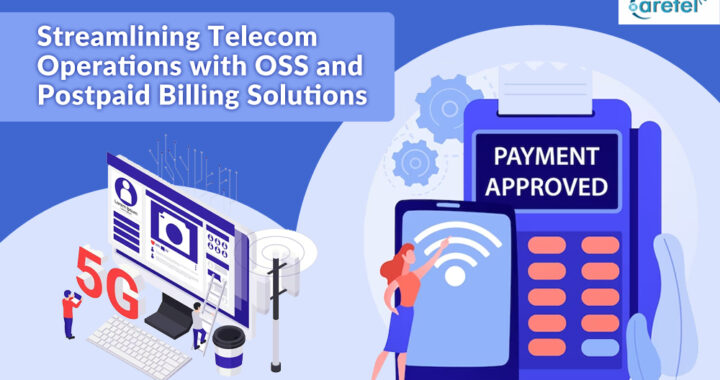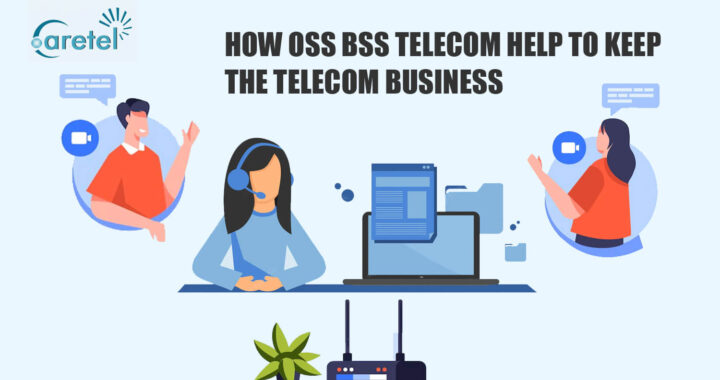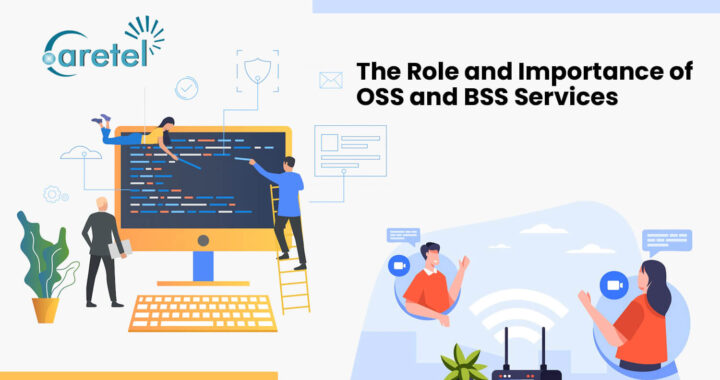The OSS BSS architecture, which is best described as the ‘backbone systems’ of telcos, enables end-to-end services that improve client interaction. The operational and commercial parts of the telecom are represented, respectively, by the OSS and BSS services. Despite being used interchangeably, these two terminologies serve purposes that are distinct from one another. But can their clients who are digital natives be served by the outdated OSS/BSS architecture? The answer is unmistakably “No.” In fact, these outdated systems are unable to propel telcos on their own journey to become Digital Service Providers (DSPs).
Modernising telecom OSS/BSS software is therefore crucial to allowing digital interaction and addressing the changing demands of customers. Let’s try to discover answers to some fundamental issues first, such as what is OSS/BSS, how OSS and BSS work together, and what are the advantages of these organisations in the telecom industry, before moving on to more specifics.
Moving forward, the service layer architecture used by the OSS and BSS services at Caretel will be replaced with a more cloud-native design. This approach offers a wide range of advantages, including labour and company agility, rapid market entry, enormous scalability to meet a wide range of demands, rapid innovation, and cost reduction. More communication service providers (CSPs) are aiming to migrate their OSS/BSS to cloud-native platforms as a result of increased cloudification and fast digitization occurring everywhere.
OSS BSS Services Explained
OSS (Operational Support System) can be described as a vital system that consists of specialized software tools (occasionally hardware) to analyze, monitor, configure, and manage all operational activities related to the telecom network. OSS mainly helps in network performance, fault management, provisioning of new services, configuration, network inventory, and service assurance.
BSS (Business Support Systems) refers to software applications that support all business and customer-facing activities of the telecom network. BSS telecom applications deal with billing, order management, service fulfilment, revenue management, customer relationship management, product catalogues, etc. With the BSS platform/concept, telecom operators can drive agility and operational efficiency and support new business models.
Since they are regarded as the entrance to controlling the whole telecom site, working with OSS and BSS is crucial in the telecom industry. The automated business process is assisting this cause thanks to technological breakthroughs in analytics and the cloud.
Typically, the OSS sends service requests and information to BSS, allowing BSS to concentrate on handling business matters relating to site administration. Order management site inventory and more comprehensive operations and maintenance will be handled by OSS. Service fulfilment, customer and product management, contract management, billing and revenue management are all included in BSS at the same time.
Present market condition for oss and bss services
The same is true with OSS/BSS; typically, it takes time—in some cases, years—before procedures are reformed to encompass all departments and the new organisation settles into a lean and lucrative machine. These systems are intended to maintain the network’s profitability as well as its operational functionality. However, in order for today’s complex networks to function properly, both systems’ features must be compatible with various product and service lifecycles.
Since they are regarded as the entrance to controlling the whole telecom site, working with OSS and BSS is crucial in the telecom industry. The automated business process is assisting this cause thanks to technological breakthroughs in analytics and the cloud.
Typically, the OSS sends service requests and information to BSS, allowing BSS to concentrate on handling business matters relating to site administration. Order management site inventory and more comprehensive operations and maintenance will be handled by OSS. Service fulfilment, customer and product management, contract management, billing and revenue management are all included in BSS at the same time.
A telecom billing specialist Making the BSS/OSS Transformation Process Easy
To ensure the smooth installation of our telecom billing systems, we offer extensive services. We offer a wide range of services, from project management and on-site launch assistance to business analysis and database transfer. Because of our methodical approach to implementations, there is greater predictability, a reduction in mistakes, and a shared knowledge of key project components including goals, timeframes, and investment.
To meet important deadlines and steer the project towards completion, our project managers employ a phase-gate method that includes an integrated project plan and scope papers.
Shape the Future of the Telecom Industry with oss and bss services
The processes of product management, order management, customer service provisioning, revenue management, and customer management are primarily served by BSS (Business Support Systems). However, a digital BSS may enable 5G monetization, allowing it to support hybrid networks and guaranteeing heterogeneity across these trips.
Operation Support Systems and Business Support Systems are referred to as OSS BSS architecture in the telecommunications industry. Service providers offer a range of tasks and services with the use of oss bss telecom of Caretel. However, in the world of communications, OSS and BSS have distinct functions.
OSS controls network and order operations, whereas BSS is in charge of taking orders, looking after customer relations, etc. Both OSS and BSS interfaces are expanding.
In the competitive telecom world of today, telecom site management appears to be becoming increasingly important. The traditional mobile network operator (MNO) is giving way to independent towers or MNO captives. Such change enables MNOs, telecom infrastructure providers, and operators to remain competitive and increase their attention to client acquisition methods.
In addition to towers, a variety of other equipment, such as fibre, data centres, and tiny cells, can be studied and may also attract attention. A new transformation in infrastructure, including fibre backhaul, tower reinforcement, edge computing, and hyper-scale data centres, will be brought about by the arrival of 5G.
How to use oss bss telecom that is native to the cloud
Communication Service Providers (CSPs) are improving and changing every aspect of their service delivery strategy in response to rising client demands. Customers anticipate individualised interactions across several channels.
These forces CSPs to strengthen management infrastructure across three key domains: network services management (NSM), operations support systems (OSS), and business support systems (BSS). The existing OSS and BSS are outclassed while being crucial management solutions for networks and telephony.
The CRM, Order management, billing, provisioning, network operations, customer support system, and other features are all covered by the OSS and BSS services. These OSS and BSS systems are inflexible, isolating, and need specialised knowledge, necessitating extensive human engagement. They are ill-prepared to deal with the evolving business connections and norms of the new telecom era.
Gradual Change
Modernizing the oss bss solutions ought to be done gradually. It is uncertain that attempting the transition at scale would be successful and may cause company disruption. Usually, a network operator will begin automating discrete business procedures that have a defined purpose.
The OSS/BSS platforms’ independence enables CSPs to package their services to take advantage of their particular needs. Services such as telephony, message, data, video, and hosting are considered standard requirements. Network operators may be required to provide and support these services in a variety of settings, including the workplace, home, and transit.
By enabling speedy optimization without service disruption, such a method ensures outcomes. Additionally, at Caretel, we enable managers to demonstrate the new technology while allowing staff to work in a microservices environment. Network administrators can improve and containerize outdated systems with the use of API management wrappers. This reduces operational expenses and increases scalability and dependability with few disruptions.
In cloud architecture, you should include new capabilities such as containerized services. The management domains should then be reconfigured after introducing a variety of microservices. The network is automated by combining distinct domains into a rationalised cross-domain environment. Additionally, it makes sure that your organisational structure is unique.
OSS Architecture – what is it?
The management of communication networks is the responsibility of OSS (Operational Support Systems). However, OSS architecture encompasses all aspects of software, hardware, system connections, and business processes.
Operational Support Systems is the official name for OSS. The duties performed in communications services are referred to as operational or operations. These duties, however, primarily focus on launching services and networks as well as finishing up technical and infrastructural chores necessary for communications.
Support refers to the assistance needed to carry out operational responsibilities. For instance, automating processes, enhancing the network and services, and accelerating the execution of operational duties are all examples.
Systems refer to the equipment needed to provide telecommunication network services. As an illustration, organizations use a variety of applications to carry out OSS functions. This programme is set up on a computer, server, or cloud.
Describe BSS
Business Support Systems is the abbreviation. It outlines the operational problems that affect businesses or customers. For instance, several BSS solutions can enhance the client experience by generating invoices and new offers. BSS is also used for inter-network communication.
By grouping them, this software solution is often utilised to handle all corporate processes. However, by working together, OSS and BSS services can produce a customer-facing network service that is effective and dependable.
Limitations of OSS Architecture BSS
As we have seen, our professional telecom billing specialist interacts and cooperates to enhance customer experience while communicating over a network. However, there are several problems that both OSS and BSS design share. These are a few of them.
- Integration from point to point
The OSS/BSS design integrates with several external systems. For instance, the billing system has to be immediately updated whenever a CSR edits data in the CRM system. To communicate with these other systems, the organisation will need a variety of interfaces. Although time-consuming, this procedure can lessen the complexity of integration.
Applications are closely connected in oss bss billing. We must thus rewrite the application whenever the business environment changes. These structures are not adaptable. As a result, adjusting to any changes in the business environment will take time and have an impact on the system’s performance.
- Incorporating an outside system
As we have seen, various external systems are compatible with OSS/BSS. Additionally, this external system has its datasets and traditional interfaces. Therefore, integrating with outside systems is a difficult procedure. Rebuilding the programme to interface with the external system will involve a significant amount of development work, and we will also need some database management tools to transform information by the datasets.
- Management of Complex Transactions
Assume a user registers a brand-new account with the system. This is completed by the end user in a single transaction. However, the newly generated account has to be updated in the billing system, CRM, and LDAP system, among other systems.
Conclusion
Together, OSS and BSS billing platforms can effectively manage communications services. The technical functionalities are tracked and analysed by Telco using OSS. BSS, however, manages company processes and maintains the client experience. Each of these systems has its datasets and services that verify whether clients are meeting their network needs.
Monolithic OSS and BSS system migration to the cloud is a great strategy to secure the future of the telecom business. Micro apps running cloud-native OSS/BSS create an agile and dynamic telecom. It allows for individualised client experiences while fostering innovation, which boosts sales and boosts customer loyalty.
Although a slow process, moving to a cloud-native OSS and BSS infrastructure has high ROI. Before moving all functionality to the cloud, CSPs that adopt gradually must operate in a hybrid environment to prevent service disruption.










